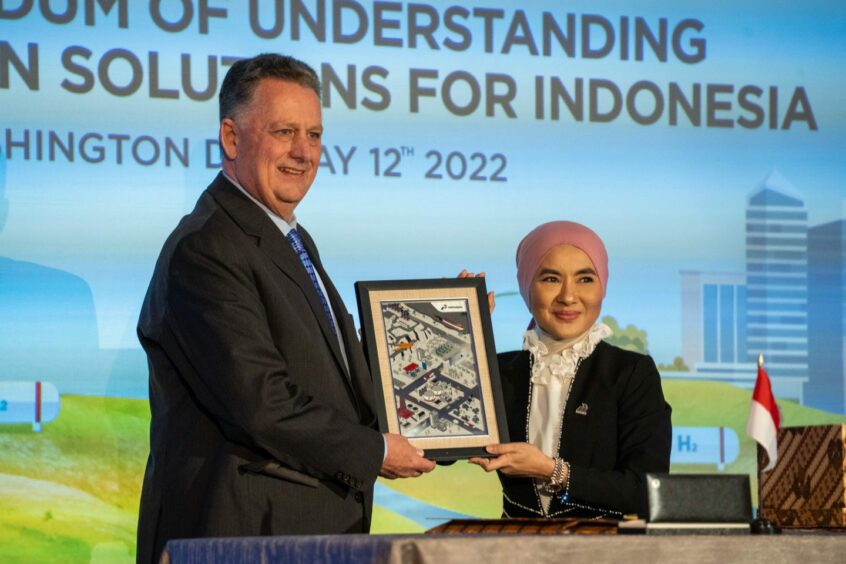
Chevron (NYSE:CVX) and Pertamina will together explore potential business opportunities in geothermal, carbon capture utilisation and storage (CCUS), as well as hydrogen, in Indonesia, after signing an agreement in Washington.
“Aimed at serving local and potentially regional customers, Chevron and Pertamina plan to consider novel geothermal technologies; carbon offsets through nature-based solutions; carbon capture, utilisation, and storage (CCUS); as well as lower carbon hydrogen development, production, storage, and transport,” the pair said in a statement on Thursday.
The signing ceremony for a memorandum of understanding was attended by Jay Pryor, vice president of corporate business development for Chevron, Nicke Widyawati, president director & CEO of PT Pertamina (Persero), Luhut B. Pandjaitan, Coordinating Minister for Maritime and Investment Affairs of the Republic of Indonesia, and Bahlil Lahadalia, Indonesia’s Minister of Investment/Head of BKPM.
“Through our potential work in Indonesia, and the entire Asia Pacific region, we hope to provide affordable, reliable, ever-cleaner energy, and help the industries and customers who use our products advance their lower carbon goals.” said Jeff Gustavson, president of Chevron New Energies.
The partnership between Chevron and Pertamina is part of efforts from both companies to support the Government of Indonesia’s net zero emission target in 2060. Pertamina said it is committed to increasing its renewable energy mix from 9.2% in 2019 to 17.7% in 2030.
Indonesia’s national energy company Pertamina plans to spend up to $11 billion over 2022-2026 to help develop its renewables business as the company seeks to accelerate the energy transition.
Meanwhile, the Indonesian government estimates that Southeast Asia’s largest economy will need investments of up to $25.2 billion to develop green hydrogen from 2031 to 2060.
“Pertamina, as the largest state-owned energy company in Indonesia, remains committed to accelerating energy transition in accordance with the government’s targets. This partnership is a strategic step for Pertamina and Chevron to complement each other’s strengths and develop lower carbon energy projects and solutions to promote energy independence and domestic energy security,” said CEO of Pertamina Nicke Widyawati.
Indonesia, as the second largest country with geothermal installed capacity, has developed geothermal since 1974. Currently, Pertamina through its Subholding Power & NRE, has a total installed geothermal capacity of 1,877 megawatts (MW) originating from 13 geothermal work areas, of which 672 MW come from work areas that are operated independently and 1,205 are joint operation contracts (JOC). The independently operated work area with a total capacity of 672 MW includes Sibayak Area at 12 MW, Lumut Balai Area at 55 MW, Ulubelu Area at 220 MW, Kamojang Area at 235 MW, Karaha Area at 30 MW, and Lahendong Area at 120 MW.
In addition, Pertamina is also diversifying geothermal development; an ongoing green hydrogen pilot project, among others, is being developed in the Ulubelu Area with a production target of 100 kg per day, and brines to power which is being developed in the Lahendong Area and has a potential capacity of 200 MW out of several other work areas.
Nicke added, in collaboration with various parties, Pertamina is also developing the implementation of carbon capture and storage (CCS) and carbon capture, utilisation, and storage (CCUS) as one of the company’s strategies to reduce carbon emissions in two oil and gas fields namely Gundih and Sukowati. Pertamina is also reviewing the commercialisation of the application of CCUS technology in the Sumatra region.
The Indonesian government currently has an energy transition roadmap as part of the Grand National Energy Strategy. In the roadmap, the use of renewable energy is targeted to reach 23% by 20251.
Meanwhile, the government has also acknowledged the importance of a collaborative approach to achieve lower carbon goals.
“Without a doubt, efforts to boost lower carbon energy projects cannot be done alone. In the future, we hope that world-class oil and gas companies, such as Pertamina and Chevron, can partner to further reduce carbon emissions and advance energy transition as mandated by the Government of Indonesia,” concluded Luhut B. Pandjaitan.
Recommended for you

